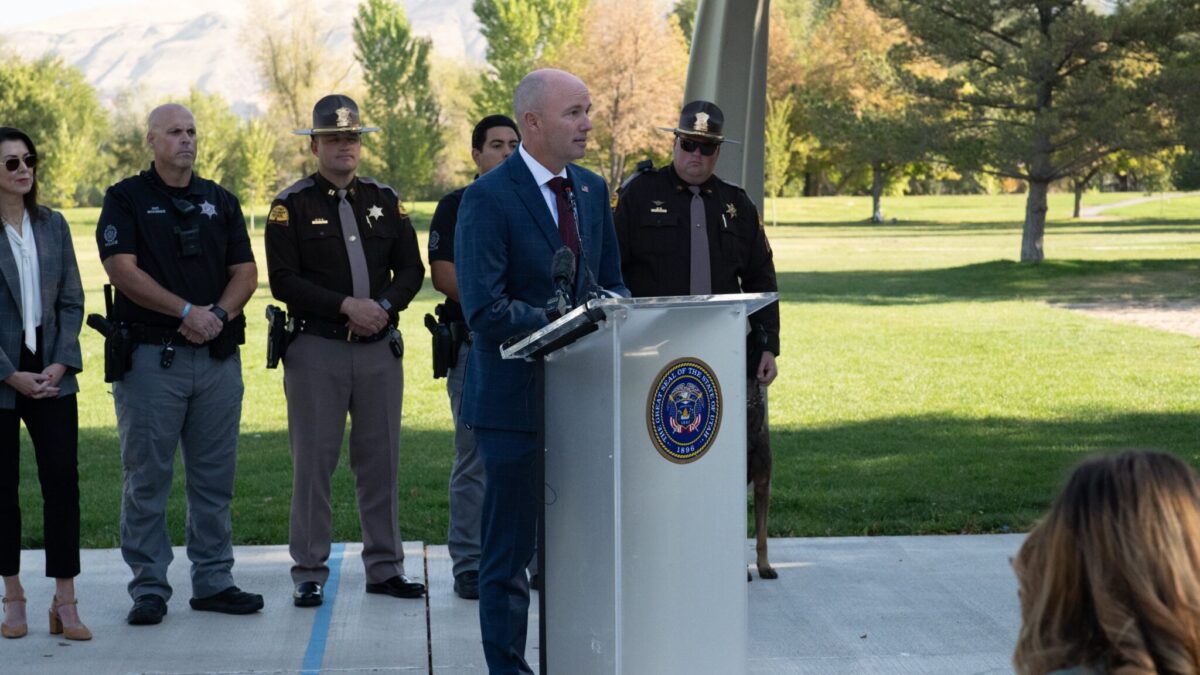Politics
Utah responds to a surge in overdose deaths with the launch of new fentanyl task force

Utah Gov. Spencer Cox announces a new task force to combat the fentanyl crisis in Utah in Cottonwood Park in Salt Lake City on Tuesday, Oct. 15, 2024 Photo: Office of Utah Gov. Spencer Cox
With a record amount of fentanyl flooding the country and more Utahns dying from overdoses than ever before, the state is launching a new task force that Gov. Spencer Cox says will “disrupt” the drug market.
Cox and other state law enforcement officials announced the task force on Tuesday, speaking on the heels of some sobering new data. In 2018, authorities in Utah seized 15,000 fentanyl pills — in 2023, law enforcement recovered roughly 2 million. That same year, 606 people died of a fatal overdose, a record number, with 290 believed to be fentanyl-related. As of June, nearly 35% of the state crime lab’s drug submissions tested positive for fentanyl.
“The true extent of fentanyl-related cases is likely underreported,” Cox said, speaking from Cottonwood Park near Salt Lake City’s Jordan River Trail, a hotbed for drug activity. In the last 30 days, Salt Lake City police officers made 102 arrests along the trail, many of them resulting in fentanyl, methamphetamine, heroin, drug paraphernalia and weapons seizures, according to the department.
Sometimes, officers see people with well-paying jobs stopping by the trail to pick up fentanyl so they can get through the day; parents will meet with dealers while their kids wait in the car, just a short walk from where the governor spoke Tuesday, Utahns could score fentanyl in just five, maybe 10, minutes.
“It was easy to get. Too easy, in fact. Many times, I picked it up right here along the Jordan River Trail,” said Misti Lopez, who spoke during the news conference. Now more than three years sober, Lopez runs Level Up IOP, an outpatient program she operates with her husband, tailored to people who live in rural areas or need a virtual option to get treatment.
Lopez told Utah News Dispatch she’s excited about the new task force.
“We need a lot more support out in the cities because it’s everywhere, and it’s hard for them to keep up. So I think having the task force is going to be specifically helpful for fentanyl,” she said.
The task force has a handful of objectives, detailed by Utah Department of Public Safety Commissioner Jess Anderson.
Prevention and treatment, promoting educational programs and public health campaigns to raise awareness. Disrupting trafficking networks that supply the state and region with fentanyl. Partnering with local, state and federal law enforcement agencies. Addressing what Anderson called “root causes” by investigating the social, economic and psychological factors driving fentanyl use. Collecting statewide data on things like fentanyl use, arrests and overdoses.Analyzing policies and criminal penalties for people convicted of dealing drugs.
“Our goal with this task force is to reduce demand through prevention and treatment, addressing root causes of fentanyl abuse, and disrupt fentanyl trafficking networks,” said Cox.
In a first-of-its-kind settlement, Utah will get millions from company that promoted OxyContin
The funding for the task force comes from a few revenue streams — Cox said there are some federal programs that will help the state, and his administration will continue to lobby Congress for more financial help.
The state is also getting millions of dollars from settlements with opioid manufacturers and vendors that could help fund some of the task force’s initiatives. Companies like Teva, Allergan, CVS and Walgreens are set to pay Utah $209 million over the next 15 years for their role in the opioid crisis, while the health care marketing and communications company Publicis Health will pay the state an additional $4 million. There are millions more in settlement funds likely headed to the state, with payouts from other companies, including the Sackler family’s infamous Purdue Pharma, still pending.
And, the legislature will play a key role in putting state dollars behind the program.
There, Mexican drug cartels manufacture the pills and smuggle them through the U.S. border. Nearly 90% of fentanyl seizures at the border happen at legal ports of entry and about 85% of convicted smugglers are U.S. citizens, according to U.S. Customs and Border Protection.
Surge in overdose deaths has moved westward, even as they fall nationally
During the news conference Tuesday, Cox criticized President Joe Biden’s approach to the border and immigration.
“Of the many ways that the Biden administration’s border policies have been a failure, the fentanyl crisis is the most stark and dangerous. That is not a partisan point of view, but a bipartisan point of view, expressed to me by Democratic governors and Democratic members of Congress,” Cox said. “As one Democratic, border-state senator expressed to me, every day there’s enough fentanyl trafficked through to kill half the country, and we’re not doing anything in terms of detection and interdiction.”
That comment drew the ire of Cox’s gubernatorial opponent, Rep. Brian King, D-Salt Lake City, who accused the governor of making the fentanyl crisis political on the day ballots were mailed out to Utahns.
“Twenty-one days ahead of the General Election, Governor Spencer Cox chose to politicize the fentanyl crisis rather than offer real solutions,” King said in a statement, accusing Cox of “taking a page right out of Trump’s playbook.”
“Instead of addressing the root causes of this tragic epidemic, he used his press conference to parrot anti-immigrant rhetoric and blame rather than deliver real-time solutions,” King said. “Why today — the day ballots are mailed out in his increasingly competitive re-election race? This issue has been serious for a long time, but suddenly the Governor decides to make a show of it.”
King was joined by Utah Senate Democrats and Democratic leaders, who, in a statement, urged Cox to “prioritize solutions and collaboration over political posturing” and called on him to support the experts and communities already fighting the opioid epidemic in the state.
“We are disappointed by Governor Cox’s attempts to politicize the fentanyl epidemic. His claim that the influx of fentanyl into this state is due to the U.S. southern border policies unjustly and falsely demonizes immigrants. These claims are deeply troubling and do a disservice to the collaborative work the Utah Opioid Task Force (UTOTF) has accomplished with its tenacious dedication since 2017. Blaming the fentanyl crisis on border policies is both negligent and a harmful scapegoating of a community for political gain during a reelection race,” the statement read.
by Kyle Dunphey, Utah News Dispatch



















